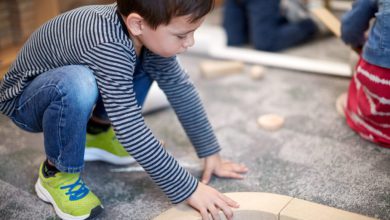Early Childhood Education Trends for Parents

In the fast-evolving world of education, staying informed about the latest trends in early childhood education is crucial for parents who aspire to give their children the best possible start in life. This article delves into the most recent methodologies, technological advancements, and pedagogical trends that are setting the stage for future learning paradigms. Understanding these trends is essential for choosing the right educational path and fostering holistic development from an early age.
1. Emphasis on STEM Learning
The integration of Science, Technology, Engineering, and Mathematics (STEM) into early childhood education has become a significant trend. Research suggests that early exposure to STEM subjects can support critical thinking skills, foster curiosity, and enable better problem-solving capabilities. Many preschools are now incorporating simple coding games, interactive science experiments, and basic math puzzles into their curriculum. This early introduction not only makes children more adept at these subjects but also sparks a lasting interest in exploring how the world works.
2. Digital Literacy and Technology Integration
As digital landscapes evolve, so does the importance of digital literacy in early education. Schools are increasingly using smart boards, tablets, and educational apps as teaching tools to enhance learning experiences. This trend is not about replacing traditional learning methods but complementing them with technology to create a more engaging, interactive, and personalized learning environment. Parents should look for programs that balance screen time with active, hands-on learning to ensure optimal development outcomes.
3. Play-Based Learning Methodologies
Play-based learning continues to gain traction as an effective educational approach in early childhood settings. This methodology emphasizes learning through play, where children engage in activities that are both enjoyable and educational. Play-based learning supports emotional and social development while also enhancing language and cognitive skills. It allows children to explore, experiment, and discover at their own pace, making learning a more natural and enjoyable part of their daily lives.
4. Focus on Social and Emotional Learning (SEL)
Social and Emotional Learning (SEL) is increasingly recognized as a vital component of early childhood education. SEL programs in preschools help children develop essential skills such as empathy, cooperation, and emotional regulation. These skills are crucial for personal well-being and success in school and beyond. Educators are now incorporating structured SEL activities into their daily routines, providing children with opportunities to practice these skills through role-playing, group activities, and guided discussions.
5. Inclusivity and Diversity Education
Educational inclusivity and teaching about diversity are becoming integral parts of early childhood education. This trend involves introducing children to a variety of cultures, languages, and experiences to foster a greater understanding and acceptance of differences. Inclusivity in education not only enriches the learning environment but also prepares children to thrive in a diverse world. Parents should consider how schools incorporate these values into their curriculum when selecting an educational institution for their child.
6. Environmental Awareness and Sustainability Education
With growing concerns about environmental sustainability, early childhood education programs are starting to impart values of environmental stewardship. This includes teaching children about recycling, the importance of conserving water, and understanding the natural world. Schools are integrating these lessons through interactive activities like gardening, nature walks, and resource-saving projects. Instilling such values from a young age can cultivate a lifelong respect and responsibility for the environment.
7. Multilingual Education
Introducing children to multiple languages at an early age is becoming increasingly popular in early childhood education settings. Multilingual education can enhance cognitive development and improve children’s ability to concentrate and multitask. Furthermore, children who learn additional languages early in life often show greater empathy and adaptability in diverse environments. Parents should look for schools that offer language immersion programs or classes in foreign languages as part of their curriculum to give their children the advantage of multilingual skills.
8. Parental Involvement and Engagement
The trend towards increased parental involvement in early childhood education is gaining momentum. Schools are now offering more opportunities for parents to engage with their child’s learning process, both in and outside the classroom. This can include regular parent-teacher meetings, workshops on effective at-home teaching strategies, and school events that allow parents to experience learning alongside their child. Such involvement helps to reinforce the educational activities at school, build a stronger parent-child relationship, and ensure consistency in the child’s development.
9. Customized Learning Paths
Customization in early childhood education addresses the individual learning styles and paces of different children. Educators are increasingly using assessments and observations to create personalized learning plans that cater to the specific needs and interests of each child. This approach can involve tailored activities, differentiated teaching methods, and adaptive learning materials that ensure all children achieve their potential. Parents should consider schools that prioritize personalized learning to provide a truly supportive educational environment for their children.
10. Health and Physical Education
Physical health and wellness are becoming integral parts of the curriculum in early childhood education. This includes not only physical activities and sports but also education on nutrition, hygiene, and mental well-being. These programs aim to instill healthy habits from a young age, promoting lifelong wellness. Schools are incorporating daily physical activities, lessons on healthy eating, and mindfulness exercises that help manage stress and boost emotional health.
11. Assessment and Feedback Innovation
Advancements in assessment methods are changing how children’s progress is monitored and communicated in early childhood education. Traditional testing is often being replaced or supplemented by dynamic assessments that focus on growth and continuous learning. This includes portfolio assessments, observational records, and regular feedback sessions that provide more comprehensive insights into a child’s development across various domains. Such innovations in assessment help educators tailor educational experiences more effectively and keep parents better informed about their child’s progress.
Conclusion
The trends in early childhood education are geared towards creating a more inclusive, engaging, and personalized learning environment that prepares children for the challenges of the future. For parents, staying updated on these trends is crucial for making informed choices that best support their child’s growth and development. By selecting educational paths that align with these forward-thinking practices, parents can significantly contribute to their children’s success and well-being in their formative years.





